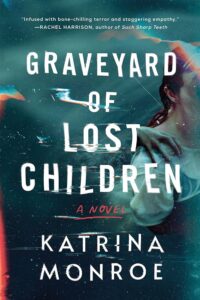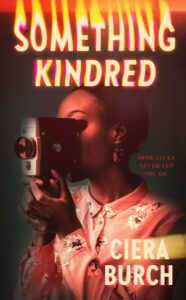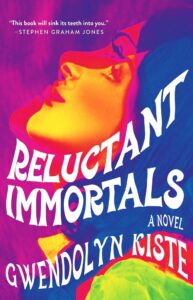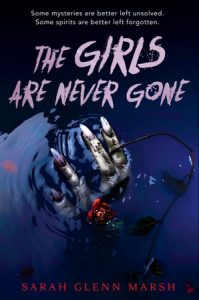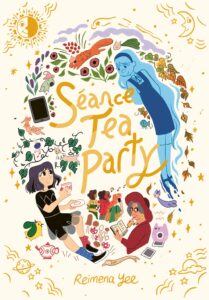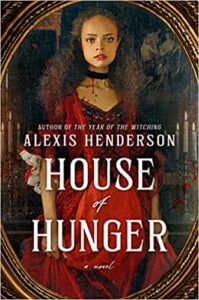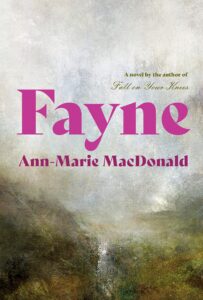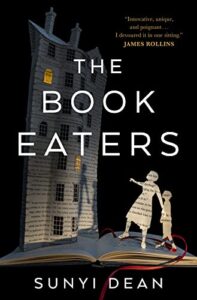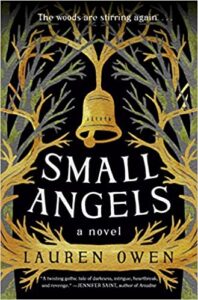Buy this from Bookshop.org to support local bookstores and the Lesbrary!
After giving birth to her daughter, Olivia is struggling—not just with being a first-time mother, but mostly from being haunted. She hears voices whispering terrible things to her, a black-haired ghost is following her in her nightmares, and her body is deteriorating rapidly from her child’s never satiated hunger. And, despite her best efforts, she cannot help but notice that history is repeating itself for the worst.
Years before, her own mother tried to kill her. Obsessed with the idea that her child was a changeling—a substitute left by a supernatural being after kidnapping her own daughter—Olivia’s mother tried to make a deal with an evil spirit living at the bottom of a well, which almost cost her her life at only 4 months old. And while everyone always told Olivia that her mother had been a troubled woman with complicated health issues and a fragile state of mind, she is now questioning what really happened all those years ago, and what exactly is happening to her now.
Told from a dual point-of-view, jumping between the past and the present, Graveyard of Lost Children is the haunting story of motherhood and the cycle of fear and violence that gets passed down through generations of mothers trying to reach an unattainable standard of perfection.
If there’s one thing you need to know about me, it’s that motherhood is one of the most terrifying experiences I could imagine for myself. From being pregnant to taking care of a baby to raising an actual child, I get shivers down my spine just thinking about it. Graveyard of Lost Children was, therefore, essentially my biggest fears coming to life on page, right before my eyes, and I loved every second of it. As soon as I finished this book, it dawned on me that I’d just had the privilege of experiencing absolute genius, and I remembered why I so deeply love and appreciate the horror genre.
I would have expected this novel to be so far removed from my own life experiences that it would have too little of an effect on me to be a memorable story. However, having a lesbian take on that bone chilling role of motherhood and being able to see her, from the beginning, struggle with truly loving being a first-time mother, made Olivia extremely relatable to me, and I found it impossible to remove myself from the narrative. I felt so deeply connected to her, and it made the entire reading experience so potent.
The gem that Monroe managed to create with this novel really lies with its ability to convey how terrifying it is to become a mother for the first time. The narrative took its time to explore the anxiety and the feeling that people are looking at you differently or treating you differently or judging you for every little choice that you make. It then shows how an extremely guilt-tripping fear starts to settle in, making you question yourself and forcing you to wonder if you are in fact a bad mother who is making all the wrong decisions.
Monroe makes multiple fascinating literary choices with this book, one of which is writing a story about motherhood through the eyes of a lesbian main character. It suddenly becomes not just about the experience of motherhood, but specifically the experience of being the person within your couple who gave birth to your child. Olivia is a lesbian who does have a wife, but she is the one who underwent the pregnancy and gave birth to their daughter. This creates an interesting dynamic, because although it is clear that her wife wants to support her and understand what she’s going through, there is inherently a rift that is created between both women. As much as she wants to be there for Olivia, it is very difficult for her to grasp just how difficult it is to be a mother right after pregnancy.
Another indication that Monroe is an incredibly talented author is that she forces her reader into the position of an antagonist, driving the point of her story home in a deeply personal manner. Olivia is undergoing all these seemingly inexplicable horrors that are affecting her physically, emotionally, and psychologically. But, because she is a mother, everyone believes that it is all simply “in her head”; everyone, including you as the reader. Your entire reading experience essentially consists of you trying to figure out what is real, what isn’t, if you can actually trust the narration, and whether or not Olivia is losing her grip on reality through a postpartum psychosis or if there is in fact something supernatural at play. Her biggest issue is that she doesn’t know who to trust, because no one really believes her: her wife, her doctor, her friends. And although you are following her through her journey, Monroe chose to write Olivia’s chapters through a third person point-of-view which, especially in contrast with her own mother’s present-day chapters being told through a first-person narration, creates a distance between Olivia and the reader. By the very format of the book, Monroe forces you to perpetuate the cycle of doubt and pity by which first-time mothers often feel heavily attacked. It is a master class in making specific literary choices that not only make your story more interesting but are inherently tied to the message you are trying to convey.
Of course, aside from the genius that is subtly peppered through Monroe’s craft, she also has an amazing ability to write affective scenes and passages. Olivia spends so much time suffering from bruising and soreness and all kinds of pain that people feel after having undergone pregnancy, and although I have never come close to experiencing even an iota of that pain, I genuinely felt exactly what Olivia was going through. I felt my body aching as I was flipping through the pages, but I could not get myself to stop reading. It was a terrifyingly visceral experience that I would recommend in a heartbeat.
I appreciate that Monroe doesn’t try to sell you this fantasy of motherhood that is all sunshine and rainbows, but at the same time doesn’t villainize or discredit it. It was perfectly nuanced, very well written, and overall, horrifyingly entertaining.
Representation: lesbian MC, lesbian parents
Content warnings: postpartum-depression and psychosis, suicide attempt, attempted murder, thoughts of self harm, thoughts of harm to a baby/child, forced institutionalization, psychiatric hospitalization, paranoia, anxiety, death, graphic description of childbirth, manipulation, emotional abuse, medical trauma

